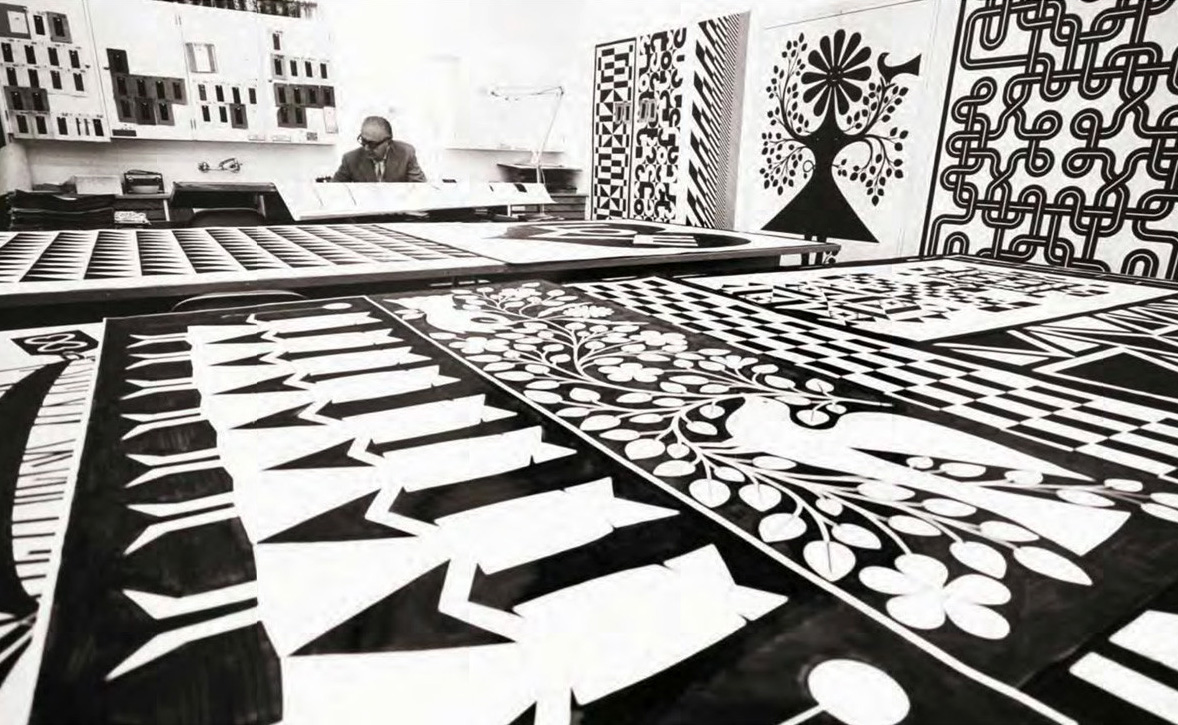To continue our series of articles on the great names in graphic design, we told you a few weeks ago about Alexander Girard (1907-1993) discovered at the Vitra Museum. Although his name seems unknown to most of us, he is nevertheless one of the most influential designers of the post-war period. His work had a profound impact on the 1960s.
He has worked in almost all fields of design: textile, graphic, typography, interior design, objects, and even furniture!
Alexander Girard, the color fool
Born in New York in 1907, to an American mother and a Franco-Italian father, he grew up in Florence, Italy. A graduate of the School of Architecture in Rome, he returned to New York in 1932, after having travelled all over Europe. It was during these European years that he fed his creativity with the then nascent modernist influence.
He could have become a brilliant architect, but Girard did not like straight lines and drawn fates. From 1948 to 1956, he was a colour consultant for General Motors. In 1952, he was hired by Herman Miller, one of the largest furniture manufacturers of the time. He took over the textile division. He then worked with the best designers: George Nelson, Eero Saarinen, Charles and Ray Eames.
During this period, his talent for power was expressed, and it was there that he created countless textile motifs.
His work is strategic. He uses color to humanize the functionalism of Hermann Miller's furniture. And if the industrial manufacture of the latter makes it possible to multiply easily the variations of colors and materials, it is above all a question of making forget that it is about furniture in series ! Thus, each consumer can pride himself on having a unique combination of colors! By designing seasonal collections, he brings fashion into the home.
Alexander will therefore display his palette of colours and illuminate the interiors of the post-war middle classes.
Below are some of his textile prints:
Below are her wallpaper collections:
The color of folklore!
Although he does not theorise his approach specifically, Alexander Girard bases his work on a perfect mastery of the chromatic circle and a passion for popular art. This last passion will have a great influence on his work. Moreover, he travelled all his life, collecting tens of thousands of objects that finished at the International Museum of Folk Art in Santa Fe.
From this taste for folk objects were born the "Wooden Dolls", which Girard made himself for his house. Initially created for fun, they are both decorative elements and toys. They are currently edited by Vitra.
The influence of popular art will be felt throughout his career. This is reflected in the "handmade" character of his works, for example below, for this wallpaper collection.
La Fonda del Sol
In 1960, Girard was entrusted with the "global design" of a Manhattan restaurant. Girard's warm blood and Latin spirit will perfectly fit the spirit of the project. He must design everything, from the menu to tablecloths, vases and tapestries.
A large typographical mural fresco will be created for the restaurant decor.
During this period, Girard designed many restaurant projects. One can quote the restaurant "l'Étoile" (1966) and "The compound Restaurant" (1967).
Braniff Airways re-Branding
In the mid-1960s, he was invited to work on the overall design of Braniff International Airways. This will be an opportunity for Girard to work on a large scale. Every detail goes through its screen: from the plane ticket to the sugar sachets. The planes are all painted in different colors ranging from dark grey to vermilion.
"You can use our company every day of the week, without ever flying twice in a plane of the same color!" was bragging about Braniff's leader at the time.
A corporate typography will even be designed by Girard for Braniff International!
Braniff's business became flourishing and he gained total confidence from the management. He even went so far as to design a card game for international customers, with a series of survival phrases translated into 3 languages... a little personal luxury!
Braniff, the end of the plain plane
"The end of the plain plane"... Behind this amusing slogan lies a real desire to revolutionise the conception of what an airline can be. The waiting rooms, the reception banks, the hostesses' uniforms, everything is carefully designed!
In 1967, Girard designed a collection of furniture for Braniff's salons. The exorbitant cost to produce these chairs, sofas and tables will force Hermann Miller to stop their production two years after their creation... Today they are real collector's items!
Braniff and Emilio Pucci
At the same time, Braniff invited Italian designer Emilio Pucci to work on the company's uniforms. The result is surprising! He designs a clothing line that dresses both ground crews and flight attendants. These clothes are even designed to evolve with the sandstone of the flight: from the suit of cosmonaut outside... to the evening dress! Here is a video preview of these outfits:
Font designer
Girard used typography extensively in his work. His creations are now published by House Industries.
A short film presenting his typographic work through the games published by Houses Industries :
At the time of the sixties
His work still influences today!
Alexander Girard's work has influenced generations of designers. Among the heirs of her work, we can quote the textile creations of Mademoiselle Dimanche.
One can also quote the work of Séverin Millet whose multicoloured and poetic illustrations make him Alexander Girard's worthy successor.
To go further
His family has created a website to keep his memory alive. Among other things, it contains a detailed timeline.
- Houses Industries distributes typographies, puzzles, memory games and some of Alexander Girard's textile dolls.
- A superb book of more than 600 pages published by Ammo Books
- To buy its textile creations: Maharam
Sources: The images and texts in this article are presented for educational purposes.
